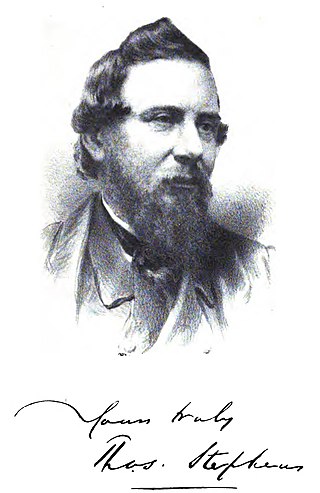A constructed script is a new writing system specifically created by an individual or group, rather than having evolved as part of a language or culture like a natural script. Some are designed for use with constructed languages, although several of them are used in linguistic experimentation or for other more practical ends in existing languages. Prominent examples of constructed scripts include Korean Hangul and the International Phonetic Alphabet.

A gorsedd is a community or meeting of modern-day bards. The word is of Welsh origin, meaning "throne". It is spelled gorsedh in Cornish and goursez in Breton.

Archdruid is the title used by the presiding official of the Gorsedd. The Archdruid presides over the most important ceremonies at the National Eisteddfod of Wales including the Crowning of the Bard, the award of the Prose Medal and the Chairing of the Bard. Although Iolo Morganwg was the first to preside over the Gorsedd when the National Eisteddfod came into being, his successor David Griffith, under the bardic name "Clwydfardd", was the first to be known by the official title "Archdruid".

Ogham is an Early Medieval alphabet used primarily to write the early Irish language, and later the Old Irish language. There are roughly 400 surviving orthodox inscriptions on stone monuments throughout Ireland and western Britain, the bulk of which are in southern Munster. The largest number outside Ireland are in Pembrokeshire, Wales.

Edward Williams, better known by his bardic name Iolo Morganwg, was a Welsh antiquarian, poet and collector. He was seen as an expert collector of Medieval Welsh literature, but it emerged after his death that he had forged several manuscripts, notably some of the Third Series of Welsh Triads. Even so, he had a lasting impact on Welsh culture, notably in founding the secret society known as the Gorsedd, through which Iolo Morganwg successfully co-opted the 18th-century Eisteddfod revival. The philosophy he spread in his forgeries has had an enormous impact upon neo-Druidism. His bardic name is Welsh for "Iolo of Glamorgan".
Welsh poetry refers to poetry of the Welsh people or nation. This includes poetry written in Welsh, poetry written in English by Welsh or Wales based poets, poetry written in Wales in other languages or poetry by Welsh poets around the world.
Runiform may refer to scripts or inscriptions similar written with letters that are similar in form to the runic scripts that were historically used to write various Germanic languages in Northern Europe. It may refer to:
Awen is a Welsh, Cornish and Breton word for "inspiration".

Thomas Stephens was a Welsh historian, literary critic, and social reformer. His works include The Literature of the Kymry (1849,1876), Madoc: An Essay on the Discovery of America by Madoc ap Owen Gwynedd in the Twelfth Century (1858,1893), and Orgraff yr Iaith Gymraeg (1859), as well as a number of prize-winning essays presented at eisteddfodau between 1840 and 1858. He was the first Welsh historian and literary critic to employ rigorous scientific methods, and is considered to have done more to raise the standards of the National Eisteddfod than any other Welshman of his time. Stephens also figured prominently in efforts to implement social, educational and sanitary reforms both locally in Merthyr Tydfil and more broadly throughout Wales.

John Jones, known by his bardic name of Talhaiarn, was a Welsh poet and architect.
Per Vari Kerloc'h is the current Grand Druid of the Goursez Breizh. He was born at Douarnenez, in the western part of Brittany. The Grand Druid is appointed for life, whereas the Welsh and Cornish equivalents are now elected every three years. Kerloc'h has been a middle manager and trade union representative with La Poste. He is a native Breton speaker and a fluent speaker of Cornish. His bardic name is Morgan.

David Griffith, known by the bardic name of Clwydfardd, was a Welsh poet and Archdruid of the National Eisteddfod of Wales.

Druidry, sometimes termed Druidism, is a modern spiritual or religious movement that promotes the cultivation of honorable relationships with the physical landscapes, flora, fauna, and diverse peoples of the world, as well as with nature deities, and spirits of nature and place. Theological beliefs among modern Druids are diverse; however, all modern Druids venerate the divine essence of nature.
Taliesin Williams was a Welsh poet and author, and son of the notable Iolo Morganwg.

Barddas is a book of material compiled and written by the Welsh writer Iolo Morganwg. Dressed as an authentic compilation of ancient Welsh bardic and druidic theology and lore, its contents are largely Iolo's invention. It was posthumously published by John Williams for the Welsh Manuscripts Society in two volumes, in 1862 and 1874.

The Coelbren y Beirdd is a script created in the late eighteenth century by the literary forger Edward Williams, best known as Iolo Morganwg.
The Brandenburg stone is an inscribed stone slab found in Brandenburg, Kentucky, United States in 1912, on the farm of Craig Crecelius. The stone contains a strip of linear markings that resemble letters of a script. Crecelius exhibited the stone several times, but was unable to find anyone who could identify the markings.
John Michael Greer is an American author and druid who writes on ecology, politics, appropriate technology, oil depletion and the occult.

Gorsedd Cymru, or simply the Gorsedd or the Orsedd, is a society of Welsh-language poets, writers, musicians and others who have contributed to the Welsh language and to public life in Wales. Its aim is to honour such individuals and help develop and promote their fields in addition to maintaining relationships with other Celtic nations and Y Wladfa. The Gorsedd is most prominent at the National Eisteddfod of Wales where it is responsible for the main ceremonies held.









